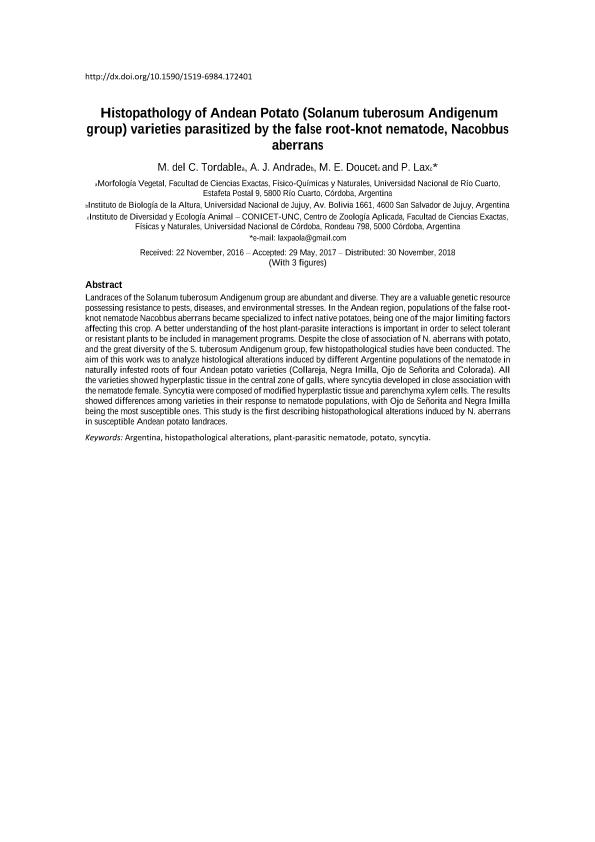Mostrar el registro sencillo del ítem
dc.contributor.author
Tordable, Maria del Carmen

dc.contributor.author
Andrade, Alberto Juan

dc.contributor.author
Doucet, Marcelo Edmundo

dc.contributor.author
Lax, Paola

dc.date.available
2019-11-27T17:45:09Z
dc.date.issued
2018-11-30
dc.identifier.citation
Tordable, Maria del Carmen; Andrade, Alberto Juan; Doucet, Marcelo Edmundo; Lax, Paola; Histopathology of Andean Potato (Solanum tuberosum Andigenum group) varieties parasitized by the false root-knot nematode, Nacobbus aberrans; Instituto Internacional de Ecología; Brazilian Journal of Biology; 78; 4; 30-11-2018; 679-685
dc.identifier.issn
1519-6984
dc.identifier.uri
http://hdl.handle.net/11336/90667
dc.description.abstract
Landraces of the Solanum tuberosum Andigenum group are abundant and diverse. They are a valuable genetic resource possessing resistance to pests, diseases, and environmental stresses. In the Andean region, populations of the false root-knot nematode Nacobbus aberrans became specialized to infect native potatoes, being one of the major limiting factors affecting this crop. A better understanding of the host plant-parasite interactions is important in order to select tolerant or resistant plants to be included in management programs. Despite the close of association of N. aberrans with potato, and the great diversity of the S. tuberosum Andigenum group, few histopathological studies have been conducted. The aim of this work was to analyze histological alterations induced by different Argentine populations of the nematode in naturally infested roots of four Andean potato varieties (Collareja, Negra Imilla, Ojo de Señorita and Colorada). All the varieties showed hyperplastic tissue in the central zone of galls, where syncytia developed in close association with the nematode female. Syncytia were composed of modified hyperplastic tissue and parenchyma xylem cells. The results showed differences among varieties in their response to nematode populations, with Ojo de Señorita and Negra Imilla being the most susceptible ones. This study is the first describing histopathological alterations induced by N. aberrans in susceptible Andean potato landraces.
dc.description.abstract
As variedades de Solanum tuberosum grupo Andigenum são abundantes e diversas, além de serem uma fonte importante de recursos genéticos antea resistência de pragas, doenças e estresse ambiental. Na região andina, populações de Nacobbus aberrans se especializaram em parasitar batatas nativas e representam o principal fator limitante que afeta a produção desse cultivo. Um melhor entendimento da interação hospedeiro-parasita é importante para a seleção de plantas tolerantes ou resistentes a serem incluídas nos programas de manejo. Apesar da íntima associação de N. aberrans com a batata e a grande diversidade de S. tuberosum grupo Andigenum, os estudos histopatológicos desenvolvidos são limitados. O objetivo do presente trabalho foi analisar as alterações histológicas de raízes de quatro variedades de batata andina (Collareja, Negra Imilla, Ojo de Señorita e Colorada) parasitadas naturalmente por distintas populações argentinas do nematóide. Em todas as variedades se observou tecido hiperplásico na zona central das galhas onde, também, se desenvolveram os sincícios em íntima relação com as fêmeas do nematóide. Os sincícios estavam constituídos por tecido hiperplásico modificado e por células parenquimáticas do xilema. Os resultados mostraram diferenças entre as variedades de batata frente às populações do nematóide, sendo Ojo de Señorita e Negra Imilla as que evidenciaram maior susceptibilidade. Este estudo constitui a primeira avaliação da histopalogia induzida por N. aberrans em variedades suscetíveis de batata andina.
dc.format
application/pdf
dc.language.iso
eng
dc.publisher
Instituto Internacional de Ecología

dc.rights
info:eu-repo/semantics/openAccess
dc.rights.uri
https://creativecommons.org/licenses/by-nc-sa/2.5/ar/
dc.subject
ARGENTINA
dc.subject
HISTOPATHOLOGICAL ALTERATIONS
dc.subject
PLANT-PARASITIC NEMATODE
dc.subject
POTATO
dc.subject
SYNCYTIA
dc.subject.classification
Otras Ciencias Biológicas

dc.subject.classification
Ciencias Biológicas

dc.subject.classification
CIENCIAS NATURALES Y EXACTAS

dc.title
Histopathology of Andean Potato (Solanum tuberosum Andigenum group) varieties parasitized by the false root-knot nematode, Nacobbus aberrans
dc.title
Histopatologia de variedades de batata andina (Solanum tuberosum grupo Andigenum) parasitadas pelo falso nematóide das galhas, Nacobbus aberrans
dc.type
info:eu-repo/semantics/article
dc.type
info:ar-repo/semantics/artículo
dc.type
info:eu-repo/semantics/publishedVersion
dc.date.updated
2019-10-16T14:26:16Z
dc.identifier.eissn
1678-4375
dc.journal.volume
78
dc.journal.number
4
dc.journal.pagination
679-685
dc.journal.pais
Brasil

dc.journal.ciudad
San Carlos
dc.description.fil
Fil: Tordable, Maria del Carmen. Universidad Nacional de Río Cuarto. Facultad de Ciencias Exactas Fisicoquímicas y Naturales; Argentina
dc.description.fil
Fil: Andrade, Alberto Juan. Universidad Nacional de Jujuy. Instituto de Biología de la Altura; Argentina
dc.description.fil
Fil: Doucet, Marcelo Edmundo. Consejo Nacional de Investigaciones Científicas y Técnicas. Centro Científico Tecnológico Conicet - Córdoba. Instituto de Diversidad y Ecología Animal. Universidad Nacional de Córdoba. Facultad de Ciencias Exactas Físicas y Naturales. Instituto de Diversidad y Ecología Animal; Argentina
dc.description.fil
Fil: Lax, Paola. Consejo Nacional de Investigaciones Científicas y Técnicas. Centro Científico Tecnológico Conicet - Córdoba. Instituto de Diversidad y Ecología Animal. Universidad Nacional de Córdoba. Facultad de Ciencias Exactas Físicas y Naturales. Instituto de Diversidad y Ecología Animal; Argentina
dc.journal.title
Brazilian Journal of Biology

dc.relation.alternativeid
info:eu-repo/semantics/altIdentifier/url/http://www.scielo.br/scielo.php?script=sci_arttext&pid=S1519-69842018005003104&lng=en&tlng=en
dc.relation.alternativeid
info:eu-repo/semantics/altIdentifier/doi/http://dx.doi.org/10.1590/1519-6984.172401
Archivos asociados
